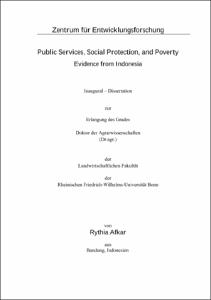Afkar, Rythia: Public Services, Social Protection, and Poverty : Evidence from Indonesia. - Bonn, 2016. - Dissertation, Rheinische Friedrich-Wilhelms-Universität Bonn.
Online-Ausgabe in bonndoc: https://nbn-resolving.org/urn:nbn:de:hbz:5n-43380
Online-Ausgabe in bonndoc: https://nbn-resolving.org/urn:nbn:de:hbz:5n-43380
@phdthesis{handle:20.500.11811/6608,
urn: https://nbn-resolving.org/urn:nbn:de:hbz:5n-43380,
author = {{Rythia Afkar}},
title = {Public Services, Social Protection, and Poverty : Evidence from Indonesia},
school = {Rheinische Friedrich-Wilhelms-Universität Bonn},
year = 2016,
month = apr,
note = {Although global poverty reduction strategies have achieved some positive results, 1.2 billion people still live in extreme poverty. Two principal strategies are commonly used to tackle poverty: the provision of public services and social protection programs. This dissertation explores the links between the two strategies and poverty reduction in Indonesia. The study starts by exploring the persistence of poverty in rural Indonesia. Using panel data of household and community surveys, the study found evidence of state dependence of poverty, that is, the likelihood of being poor is significantly associated with poverty status in the previous period. Therefore, policies aimed at lifting the poor out of poverty may not only reduce current poverty rates but might also boost long-term growth. The results also suggest the importance of public services and community infrastructures in determining household poverty status. Secondly, this dissertation analyzes the impact of decentralized public spending on education on educational outcomes. Using a panel dataset of Indonesian districts from 2001-2012, combining household surveys, village censuses, and district fiscal data, the analysis reveals that decentralized public spending on education by local governments has a negligible impact on education outcomes across income distribution, including the poor. The results suggest that improving the quality of public spending on education is essential for better outcomes of decentralized public service delivery. Thirdly, this research highlights the roles of social protection programs in response to rising food prices. Social protection helps poor households maintain their food and nutrition security, especially during crises. This study evaluates the synergy impacts of two main social protection programs in Indonesia – Conditional Cash Transfer (CCT) and Subsidized Rice Program (Raskin) – on food and nutrition security. The analysis reveals that CCT had a much greater impact on food and nutrition security for existing Raskin recipients. The study also found that providing both CCT and Raskin may not always yield better outcomes than providing only CCT. The study suggests to consider the importance of reformulating these overlapping programs, especially because Raskin consumes more than half of the social protection budget.},
url = {https://hdl.handle.net/20.500.11811/6608}
}
urn: https://nbn-resolving.org/urn:nbn:de:hbz:5n-43380,
author = {{Rythia Afkar}},
title = {Public Services, Social Protection, and Poverty : Evidence from Indonesia},
school = {Rheinische Friedrich-Wilhelms-Universität Bonn},
year = 2016,
month = apr,
note = {Although global poverty reduction strategies have achieved some positive results, 1.2 billion people still live in extreme poverty. Two principal strategies are commonly used to tackle poverty: the provision of public services and social protection programs. This dissertation explores the links between the two strategies and poverty reduction in Indonesia. The study starts by exploring the persistence of poverty in rural Indonesia. Using panel data of household and community surveys, the study found evidence of state dependence of poverty, that is, the likelihood of being poor is significantly associated with poverty status in the previous period. Therefore, policies aimed at lifting the poor out of poverty may not only reduce current poverty rates but might also boost long-term growth. The results also suggest the importance of public services and community infrastructures in determining household poverty status. Secondly, this dissertation analyzes the impact of decentralized public spending on education on educational outcomes. Using a panel dataset of Indonesian districts from 2001-2012, combining household surveys, village censuses, and district fiscal data, the analysis reveals that decentralized public spending on education by local governments has a negligible impact on education outcomes across income distribution, including the poor. The results suggest that improving the quality of public spending on education is essential for better outcomes of decentralized public service delivery. Thirdly, this research highlights the roles of social protection programs in response to rising food prices. Social protection helps poor households maintain their food and nutrition security, especially during crises. This study evaluates the synergy impacts of two main social protection programs in Indonesia – Conditional Cash Transfer (CCT) and Subsidized Rice Program (Raskin) – on food and nutrition security. The analysis reveals that CCT had a much greater impact on food and nutrition security for existing Raskin recipients. The study also found that providing both CCT and Raskin may not always yield better outcomes than providing only CCT. The study suggests to consider the importance of reformulating these overlapping programs, especially because Raskin consumes more than half of the social protection budget.},
url = {https://hdl.handle.net/20.500.11811/6608}
}






